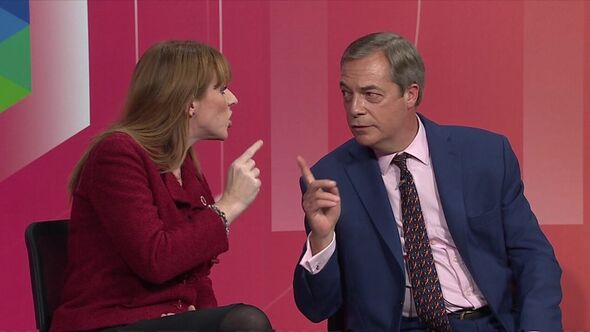Politics
Nigel Farage Challenges Labour’s Plan for Youth Voting Rights

Nigel Farage has issued a stern warning to Angela Rayner, the UK Deputy Prime Minister, regarding her party’s initiative to allow 16 and 17-year-olds to vote in elections. Farage cautioned that this policy could have serious repercussions for the Labour Party, suggesting it may lead to a significant backlash. Rayner confirmed the initiative, describing it as part of Labour’s ongoing efforts to enhance democratic participation and restore trust in political institutions.
During a press conference, Rayner stated, “For too long public trust in our democracy has been damaged and faith in our institutions has been allowed to decline. We are taking action to break down barriers to participation that will ensure more people have the opportunity to engage in UK democracy.” This policy aligns with Labour’s manifesto commitment to extend voting rights to younger citizens, aiming to foster a more inclusive electoral process.
In response, Farage, the leader of Reform UK, labeled the initiative as an attempt to manipulate the political landscape. He remarked, “It’s an attempt to rig the political system but we intend to give them a nasty surprise.” When asked about his support for the policy, Farage expressed his disapproval, stating, “I don’t think you should be able to vote in an election unless you’re also eligible to be a candidate, and I don’t think 16-year-olds should stand for Parliament.”
Recent polling data from Merlin Strategy indicates that Labour currently holds approximately 33% support among 16 and 17-year-olds, while Reform UK is gaining ground at 20%. Concerns have emerged within Labour regarding a potential new political party led by Jeremy Corbyn, which could attract younger voters and further erode Labour’s base.
Interestingly, the same poll revealed that nearly 49% of respondents aged 16 and 17 do not believe they should have the right to vote, with only 18% expressing that they definitely would participate if given the opportunity. This statistic raises questions about the actual enthusiasm for the policy among the targeted demographic.
Critics of the policy, including Sir Simon Clarke, a prominent member of the Conservative Party and director of the Onward think tank, have condemned Labour’s plan as “shameless gerrymandering.” He questioned the rationale behind lowering the voting age, noting that young people are not granted most adult rights until they reach 18, such as purchasing cigarettes and alcohol or joining the military.
Political commentator Kelvin MacKenzie also criticized the move, suggesting that it reflects Labour’s desperation to attract voters. He stated, “At 16, they know nothing of life and finance and therefore make great socialist fodder. Older voters sick of subsidising teenagers born with their hands out will vote for any party which will raise the vote to 21 or 25.”
As the debate over youth voting rights continues, the implications for the Labour Party and the broader political landscape in the UK remain to be seen. Farage’s remarks highlight a growing divide in political opinion regarding the capabilities and maturity of younger voters. With the next general election approaching, this issue may become a pivotal point of contention among the major parties.
-

 World2 days ago
World2 days agoCoronation Street’s Shocking Murder Twist Reveals Family Secrets
-

 Entertainment4 months ago
Entertainment4 months agoKate Garraway Sells £2 Million Home Amid Financial Struggles
-

 Entertainment3 months ago
Entertainment3 months agoAnn Ming Reflects on ITV’s ‘I Fought the Law’ Drama
-

 Health3 months ago
Health3 months agoKatie Price Faces New Health Concerns After Cancer Symptoms Resurface
-

 Entertainment3 weeks ago
Entertainment3 weeks agoCoronation Street Fans React as Todd Faces Heartbreaking Choice
-

 World3 weeks ago
World3 weeks agoBailey Announces Heartbreaking Split from Rebecca After Reunion
-

 World5 days ago
World5 days agoKevin Sinfield Exceeds Fundraising Goal Ahead of Final Marathons
-

 Entertainment3 months ago
Entertainment3 months agoCoronation Street’s Carl Webster Faces Trouble with New Affairs
-

 Entertainment5 days ago
Entertainment5 days agoTwo Stars Evicted from I’m A Celebrity Just Days Before Finale
-

 Entertainment3 months ago
Entertainment3 months agoWhere is Tinder Swindler Simon Leviev? Latest Updates Revealed
-

 Entertainment4 months ago
Entertainment4 months agoMarkiplier Addresses AI Controversy During Livestream Response
-

 Science2 months ago
Science2 months agoBrian Cox Addresses Claims of Alien Probe in 3I/ATLAS Discovery




















